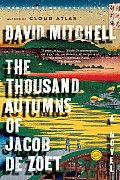 I knew nothing of David Mitchell except that people said his Cloud Atlas was a mess of a movie. I didn’t even have an author’s name to go with the movie’s title. My reading of The Thousand Autumns of Jacob de Zoet taught me what I’ve been missing. I thought I got around the literary world a bit, but guess not.
I knew nothing of David Mitchell except that people said his Cloud Atlas was a mess of a movie. I didn’t even have an author’s name to go with the movie’s title. My reading of The Thousand Autumns of Jacob de Zoet taught me what I’ve been missing. I thought I got around the literary world a bit, but guess not.
Mitchell is one powerful writer, and the word seems to be that no two of his nine novels are nearly the same. Thousand Autumns is set in Japan beginning in 1799–an historical novel. Just my thing.–and tells the tale of the titular character’s quest for riches as an employee of the Dutch East India Company. I knew the Company was a powerful global concern for centuries, but had no idea they’d ranged all the way to Nagasaki. So who is Jacob de Zoet and what is he doing there?

He’s a man of modest means who’s fallen in love with a merchant’s daughter, but her father won’t allow the marriage until Jacob can prove he’s capable of improving his fortune. Thus, with his father-in-law’s influence, he’s joined the Company and come to Japan to get rich and return to claim the hand of his betrothed. Man plans, God laughs, as the saying goes, and nothing proceeds according to Jacob’s plan.
Mitchell’s created an extraordinary character in Jacob. He his both the courage and integrity to stand up to his venal bosses, who plan to rob the company blind. A custom among people in these distant outposts, who are always double-crossing each other as well as the company. However, events transpire before his arrival that we will later come to understand make it next to impossible to achieve his ambitions. His morality is an exercise in self-destruction in this nest of avaricious vipers. But we have to understand a great deal more before we can comprehend what he’s up against.
The opening chapter is a graphic and detailed description of a midwife’s extraction of an apparently stillborn infant from an exhausted mother’s womb. She has to override the attending doctor’s objection to pull the child into the world, but her skill and determination prevail. Next chapter takes us to a hearing where a company official is “convicted” of embezzlement and other such crimes and sentenced to be shipped back to Indonesia (the nearest company headquarters) for some sort of trial and sentencing there.
What great skill Mitchell shows in narrating these two apparently unrelated events, involving characters we don’t know and who seem not to know or know of each other, making both scenes intensely dramatic and involving, then later tying them into the main narrative and cast of actors. All the details we get in these beginnings provide exposition for understanding what follows, but he doesn’t stop the action to give them to us. No awkward flashbacks or interruption of the narrative for backstory. It is backstory in and of itself, but we don’t even know it. We’re to discover for ourselves how it all ties together, which is a wonderfully intriguing process.
It’s early yet, but David Mitchell is my first candidate for Writer Working’s author discovery of 2015–even though I’m apparently just discovering what the rest of the world already knew. Ah, well, always a step behind, but still trekking.
